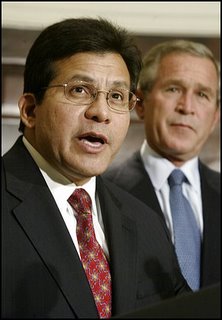DoJ: Department of Justification?

U.S. Attorney General Alberto Gonzales, who spoke today at Georgetown University, seems to be pulling out all the stops to defend the President's approval of warrantless spying by the NSA. Of course, given that the New York Times sat on the story for over a year, the administration has had plenty of time to come up with some rationale and justification for breaking the law. Unfortunately, the arguments being offered are nothing more than blatant attempts to condone criminal behavior by our own government officials.
Here is a sampling of Gonzales' comments along with my take on them:
"As far as I'm concerned, we have briefed the Congress," he said. "They're aware of the scope of the program."
The only members of Congress who were briefed were the Democrat and Republican leaders of the House and Senate Intelligence Committees. And none of them were permitted to discuss the program with anyone, including aids, lawyers, constituents or other members of Congress. For those who may have had misgivings, such as West Virginia Senator Jay Rockefeller, getting the legal opinion of a third-party lawyer was verboten. Call me crazy, but this does not constitute a "briefing of Congress" when only four members of a 535-person legislative body are involved.
"It is simply not the case that Congress in 1978 anticipated all the ways that the president might need to act in times of armed conflict to protect the United States," he told an audience at Georgetown University law school in Washington. "FISA, by its own terms, was not intended to be the last word on these critical issues."
Gonzales makes it sound like the FISA law was enacted in 1778 instead of 1978. FISA was passed by Congress just twenty-eight years ago, during the presidency of Jimmy Carter and in response to the many abuses of power exhibited by the Nixon administration in the early 70s. This isn't ancient history we're talking about. The Cold War with the Soviet Union was still going strong and terrorism had been a concern for many around the world for years. Maybe Gonzales should head to his local cinema and check out a nice little film entitled Munich.
And if FISA wasn't the "last word" on the legalities of government surveillance, it certainly was - and is - THE word based on the manner in which this country enacts laws. Our legislative process dictates that, if someone has a problem with a law that is on the books, then that person or persons may petition Congress to alter the law or to enact a new law. If the FISA law was deemed by the Bush administration to be too restrictive in some fashion, then their recourse was to request a change in the law by Congress. Did they do that? No.
"We have to remember that we're talking about a wartime foreign intelligence program," he said. "It is an 'early warning system' with only one purpose: to detect and prevent the next attack on the United States from foreign agents hiding in our midst."
Firstly, we find ourselves in "wartime" only because we choose to call this "a war" and because the Bush administration elected to start a war in Iraq without legitimate provocation. Did an attack occur in this country in September, 2001? Yes. Was it a military attack? No. Was it a criminal act? Yes. Have terrorist attacks ever happened before? Yes. Were they considered acts of war? No. Were they considered criminal acts? Yes.
Secondly, was the FISA law of 1978 not enacted in order to deter agents, in particular, of the Soviet Union? Yes, it was. In fact, I believe one could refer to them as "foreign agents hiding in our midst." Did the Soviet Union not have weapons of mass destruction? Yes, they most certainly did. In fact, they had enough nuclear weaponry to turn the United States into radioactive dust. Yet, FISA was deemed by Congress to be an adequate measure to help deter the threat.
Thirdly, while Gonzales surely would like us all to believe that the warrantless spying was carried out with the sole intention of rooting out terrorists, haven't we all as Americans earned the right to be distrusting and skeptical of our government and their intentions? FBI surveillance of civil rights leaders, the Gulf of Tonkin Resolution, Watergate, Iran-Contra, Abscam, WMDs in Iraq, Valerie Plame, Jack Abramoff, etc. And this brief list only touches the surface. You name it and our government has attempted to get away with it. Why the hell should we trust them on ANYTHING?
"This is about ... gathering up intelligence regarding al Qaeda," he said. "We're talking about communications where one end of the call is outside the United States and where there's a reasonable basis to believe that a person on the call is either a member of al Qaeda or affiliated with al Qaeda."
Well, correct me if I'm wrong, but if there's "a reasonable basis to believe that a person on the call is either a member of al Qaeda or affiliated with al Qaeda", then that should provide enough probable cause for a FISA court judge to issue the required warrant. And that warrant, according to the law, doesn't have to be issued until after 72 hours of surveillance have elapsed. One would think that 72 hours is sufficient time to determine whether or not there exists "a reasonable basis to believe that a person on the call is either a member of al Qaeda or affiliated with al Qaeda," as Mr. Gonzales contends.
"I can't speak to specific cases," he said. "What I can say is we believe the program is lawful, the information was gathered in a lawful manner and will not jeopardize any ongoing cases.
"We begin with the proposition that we believe this information was gathered in a lawful manner ... under the authorization to use military force."
First of all, the program clearly is not lawful because it was not conducted within the bounds of the law that specifically covers these activities. And, based on this law, any evidence collected in a manner that isn't allowed by this law...i.e. without a warrant...would be inadmissable in a court of law. Assuming that this administration intends to prosecute cases through the courts - which may, in fact, be a stretch - then that's a problem. They keep talking a good game about "bringing the terrorists to justice". It will be difficult to do so without legally-obtained evidence.
On Gonzales' contention that warrantless spying is allowed based on Congress' authorization to use military force, is he saying that the President is condoning "military force" against U.S. citizens? Typically, such action - sometimes referred to as martial law - is reserved for dire circumstances when the civil court system is incapacitated for one reason or another. In fact, when President Abraham Lincoln suspended habeas corpus in 1863 during the Civil War, three years later the U.S. Supreme Court determined that his actions were unconstitutional. Last time I checked, the secret FISA court set up specifically to issue surveillance warrants was still up and running. And the authorizing of military force does not extend to employing that force against U.S. citizens.
The more the Bush administration and its apologists try to justify this illegal program, the more desperate and pathetic they sound. The warrantless spying was illegal, it still is illegal, and the parties who perpetrated it need to be held accountable in a court of law. They need to be brought to justice...the real kind of justice, not some cheap bastardization of it often favored by Bush, Cheney and the Attorney General.
There is no reasonable justification for what was done. None!



2 Comments:
The administration apparently has been trying (since 2002) to substitute "reasonable basis" or "reasonable suspicion" for "probable cause" as the necessary standard for FISA searches under the Fourth Amendment.
This is why the "reasonable basis" meme is making the rounds in the last few (and next few) days as a main apologist talking point.
The big problem for the administration is that "probable cause" is still enshrined in the Constitution.
Great what those kids did though, huh? Wonderful! There's hope for the next generation! If there is one...
Post a Comment
<< Home